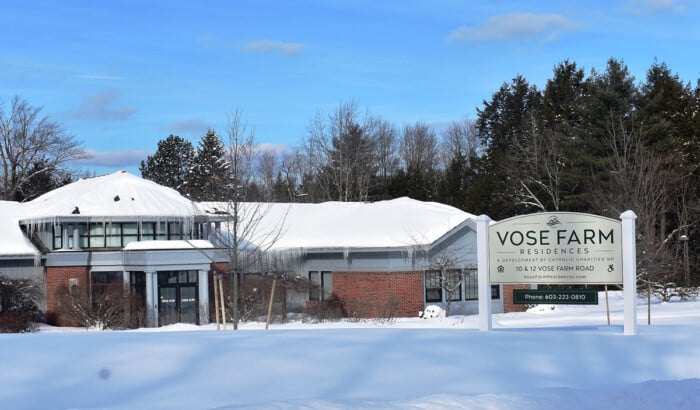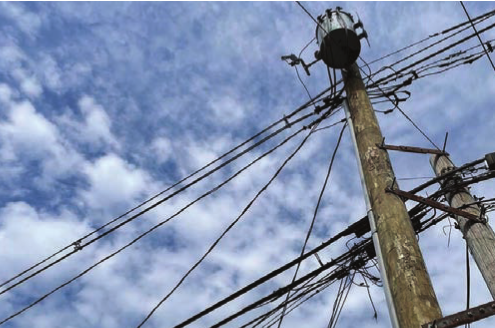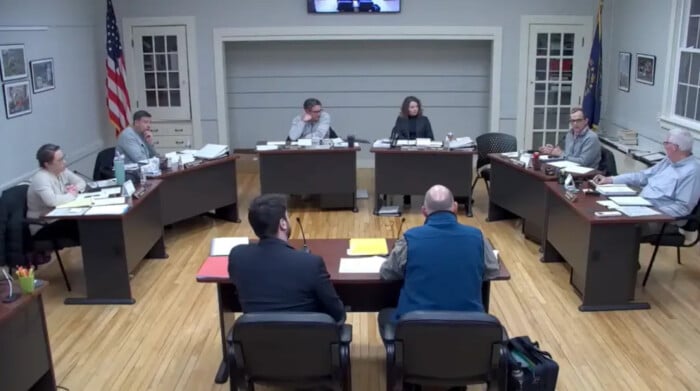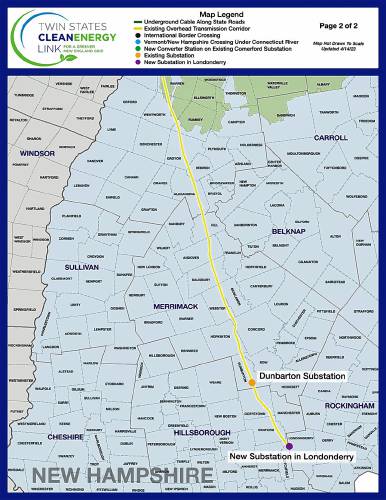
The southern portion of the proposed Twin State Clean Energy Link, which would have used existing power lines to carry more electricity from Quebec into New England. National Grid has cancelled the project for finance reasons. National Grid (Courtesy photo)
National Grid pulls the plug on a power line from Quebec that would run through Concord
Another proposal to bring large amounts of electricity from Quebec into New Hampshire, one that would have used existing power lines that cut through a corner of Concord, has died despite hefty support from the federal government.
National Grid said this week it would not go ahead with the Twin States Clean Energy Link, a 211-mile, $2 billion project that was going to carry 1,200 megawatts of electricity, equivalent to the output of Seabrook Station nuclear plant, from Quebec into the U.S. or the other way around as needed. The project was announced last year with support from Citizens Energy.
Twin State Clean Energy was one of three interstate transmission lines to enter into capacity contract negotiations with the Department of Energy last year. The $1.3 billion contract, made through the Bipartisan Infrastructure Law’s transmission facilitation program, saw the government committed to buying a percentage of the total capacity of the lines. This was designed to make it easier to lure other investors but apparently it wasn’t easy enough: National Grid announced Tuesday that it “has determined that the project is not viable at this time.”
The publication Commonwealth Beacon reported that the owners were unable to line up buyers for the rest of the transmission line’s power.
Twin States Link was much less controversial than Northern Pass, a similar-sized project through New Hampshire that was canceled in 2017 after years of debate, because much of its route would have involved relatively small expansion of existing towers and lines. That power corridor runs south from the town of Monroe on the Connecticut River through Salisbury, Webster and Hopkinton, cutting through a small section of northwest Concord, to a substation in Dunbarton. From there it goes south through Goffstown and Bedford. The new project would have ended at a new substation in Londonderry that would let the power feed into the New England grid.
For years the United States has tried to find ways to take advantage of hydropower produced in Canada. Hydro-Quebec, which owns massive hydropower dams in northern Quebec, has agreed to a 25-year contract to sell power for use in New York City via the under-construction Champlain Hudson Power Express, a 1,000-megawatt line that runs down the Hudson River valley.
Another similar power line, called New England Clean Energy Connect, being financed by Massachusetts electric ratepayers, is being built through Maine despite lots of opposition in that state. — David Brooks/Concord Monitor
Concord to work with Bow in water expansion project
After over 40 years of attempts, the city of Concord has finally agreed to work with Bow in helping extend its water main and connect it with Concord’s water system.
“They have given the OK. We’ve had meetings. Our engineers are working with their engineers and the logistics of how we would tie into their system,” said town manager David Stack.
Bow undertook the water expansion project following a feasibility study in 2019, which revealed poor water quality in the Bow Mills or Bow South Street area and Bow Junction, attributed to contamination from a gasoline additive, Methyl tertiary-butyl Ether (MtBE). The presence of MtBE is commonly associated with leaking underground gasoline storage tanks.
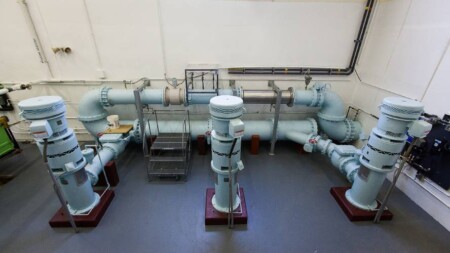
Pumps move water from Lake Penacook to the water treatment facility in Concord as seen on Friday, Jan. 29, 2016. (Photo by Elizabeth Frantz)
Even water treatment systems the Grappone auto group has installed need constant replacement of water tanks and piping because they get corroded due to the presence of sodium and MtBE chemicals discharged into groundwater as a result of leaking fuel tanks, said Stack.
With the expertise of DuBois & King, Inc., an engineering consulting firm in Bedford, the town will address the issue with a master plan implementing a water loop at Bow Junction.
It involves creating a loop in the current water main, starting from the town line where it connects with the city of Concord’s water supply. The loop will extend along Route 3A and provide a service line to the area near the Grappone auto dealerships along the Interstate 93/Interstate 89 interchange in Bow.
According to the 20-year draft agreement between the two municipalities, Bow will be responsible for maintaining the water lines within its town. Bow will also pay a premium of 10% over the current water rates for its commercial users.
Furthermore, the two municipalities will jointly shoulder any increase in property tax assessments for properties in Bow that are connected to Concord’s water supply.
If Concord had not chosen to work with Bow, the town would have had to spend $12 million to improve water quality at the two junctions and bring up their own water. However, with Concord’s cooperation, the cost is estimated to be around $3 million.
Bow hopes to start construction next summer after ironing out the details with Concord. Simultaneously, Bow is exploring grants and funding opportunities for the project.
“We’ve made a lot of progress. Just the fact that they’re willing to sit and talk about potential terms for the agreement. So we’re moving along,” said Stack. — Sruthi Gopalakrishnan, Concord Monitor
Rochester 52-unit apartment project has new owner, gets more time to build
A plan to bring a 52-unit apartment development to the city has been granted a one-year extension, giving a new owner more time to move the project forward.
Planning Director Shanna Saunders said the city was in favor of the extension, because the property is changing hands. New developer Elm Grove Properties requested the extension in order to complete plans to take over the property at 29 Wadleigh Road. The property sits on a triangular piece of land that borders Route 125, the Spaulding Turnpike and Axe Handle Brook. It is behind the Anchorage Inn.

A 52-unit multi-family development, conditionally approved in 2022 for 29 Wadleigh Road in Rochester is under new ownership and plans could be changed.
The city’s Planning Board granted the extension Monday night. The project had received conditional approval in April 2022, and it was set to expire in April this year. The extension runs until April 2025.
Matt Menning, principal of Elm Grove Properties responded to a request from Foster’s Daily Democrat, asking about his plans. He said he needed a few weeks to get details in place before speaking.
Saunders told the board the original application for the site was made by Fenton Groen, but she said the site was put on the market, with Elm Grove emerging as the buyer.
“They asked for the extension to get their ducks in a row,” said Saunders. “We had given the previous developer six months to meet conditions. We are expecting the new developer to go forward, so the city is in favor of the extension. They may be back before then, but this gives them time.”
Saunders said she doesn’t know if Elm Grove plans to build the exact project originally approved for Groen.
“If they do, they will need to meet conditions set in the original plan,” she said. “If they make any changes, they will need to return for an amended plan if the changes are not too big, and to start over if the changes are significant.”
The original footprint for the proposed building was 17,874 square feet, with 52 rental apartments, a mixture of one- and two-bedroom units, to be listed at market rate. The property is in the city’s highway commercial zone. — Karen Dandurant, Foster’s Daily Democrat





